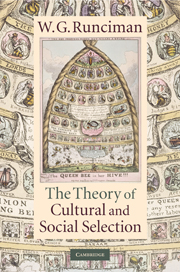Book contents
- Frontmatter
- Contents
- Preface
- Prologue: The Darwinian legacy
- 1 The neo-Darwinian paradigm
- 2 Natural selection and evoked behaviour
- 3 Cultural selection and acquired behaviour
- 4 Social selection and imposed behaviour
- 5 Selectionist theory as narrative history
- Epilogue: Sociology in a post-Darwinian world
- References
- Index
1 - The neo-Darwinian paradigm
Published online by Cambridge University Press: 05 June 2012
- Frontmatter
- Contents
- Preface
- Prologue: The Darwinian legacy
- 1 The neo-Darwinian paradigm
- 2 Natural selection and evoked behaviour
- 3 Cultural selection and acquired behaviour
- 4 Social selection and imposed behaviour
- 5 Selectionist theory as narrative history
- Epilogue: Sociology in a post-Darwinian world
- References
- Index
Summary
CONCEPTS AND PRESUPPOSITIONS
For all the influence that neo-Darwinian evolutionary theory has had over the past few decades across the human behavioural sciences all the way from economics to archaeology, sociology is still at the stage likely, in Thomas S. Kuhn's original words about ‘paradigm-change’, to be characterized by ‘deep debates’ about ‘methods, problems, and standards of solution’ which ‘serve rather to define schools than produce agreement’ (1962: 48). But its agenda too is being changed in ways that the die-hards – or ‘hold-outs’, as Kuhn called them – may continue to deplore but can no longer reverse.
Some of Kuhn's followers claimed – and he himself sometimes seemed to imply – that rival paradigms are radically incommensurable. But commitment to a neo-Darwinian conception of heritable variation and competitive selection of information affecting behaviour in the phenotype doesn't make it impossible for sociologists who are so committed to talk to others about ‘just what is going on here’ in terms readily comprehensible to, and translatable salva veritate between, both sides. Confronted with the same set of uncontested observations of a routine occurrence of a wage negotiation in a capitalist economy, a Selectionist sees an institutional practice which has out-competed its rivals where a Marxist sees exploitation of proletarians by a capitalist class, a Behaviourist sees a history of operant conditioning, and a Rational Choice Theorist sees a bargain being struck between self-interested utility-maximizers.
- Type
- Chapter
- Information
- The Theory of Cultural and Social Selection , pp. 27 - 63Publisher: Cambridge University PressPrint publication year: 2009



